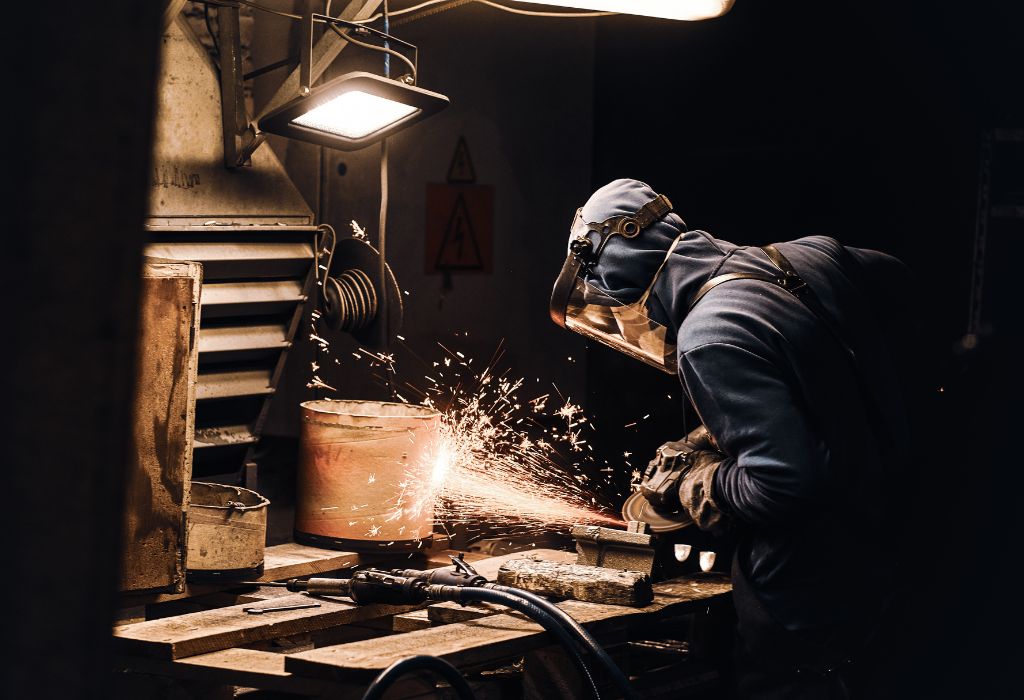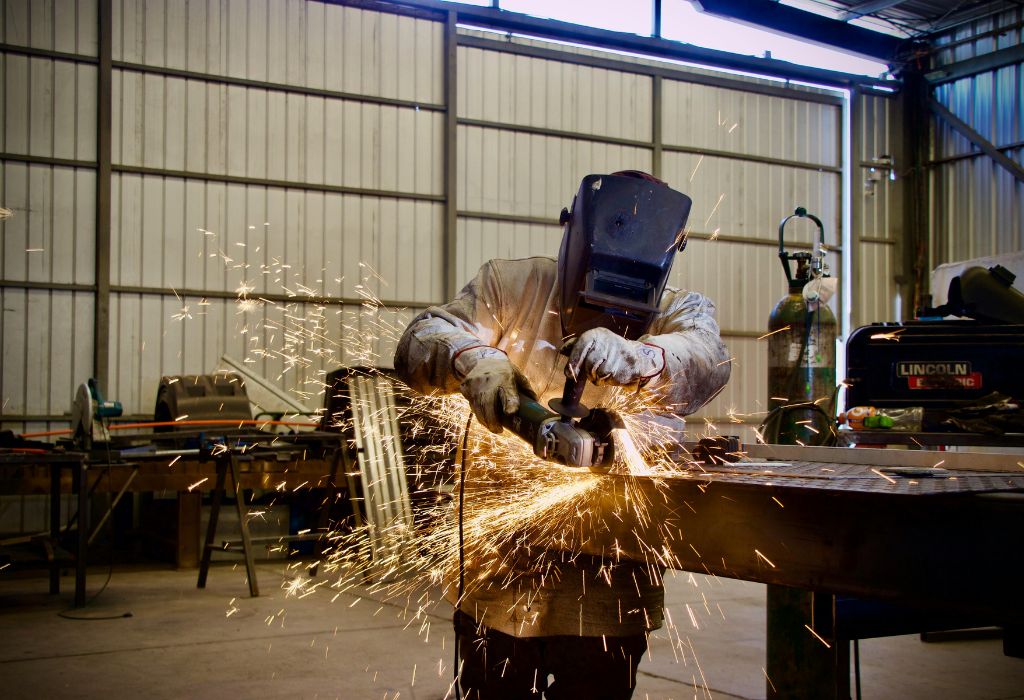A young apprentice steps into a fabrication shop, nervous before striking the first arc. The question lingers: do you need a license to be a welder before you can start working? Confusion about licensing, certification, and qualification leaves many beginners unsure of their path.
Unlike trades such as plumbing or electrical work, welding usually does not require a state-issued license. Instead, welders prove their skills through hands-on performance tests tied to codes like AWS D1.1, ASME Section IX, or API 1104. These certifications confirm the ability to produce strong, code-compliant welds under real conditions.
But there are exceptions. In cities such as New York, a Welder License is mandatory for structural work. Failing to meet these requirements can result in removal from a job or missed opportunities.
According to the U.S. Bureau of Labor Statistics, the median annual wage for welders is around $51,000 in 2024 (BLS). With steady demand and thousands of openings projected each year, understanding exactly what paperwork and qualifications are needed is crucial for long-term success.
This guide breaks down licensing vs certification, explains when a license is required, and highlights the steps welders should take to stay compliant in any job setting.
The Short Answer: Do You Need a License to Be a Welder?

In most of the U.S., a welder does not need a state license. Instead, the industry relies on certification and qualification tests that prove skill with specific processes, positions, and materials.
However, municipal exceptions exist. New York City requires a DOB Welder License for structural welding. Other local agencies, such as Departments of Transportation (DOT), may require project-specific approvals.
Q&A:
Do welders need a license in most states?
No, certification and qualification replace a formal license.
Where is a license required?
Cities like New York require a Welder License for structural work.
What do employers usually ask for instead?
Proof of certification or qualification to a recognized code.
Can you work without certification?
Not on structural or code-governed projects; employers will qualify you on hire.
Is certification the same everywhere?
No, each code (AWS, ASME, API) has its own requirements.
License vs Certification vs Qualification: What’s the Difference?
The terms are often mixed up, but they mean very different things.
- License: Government-issued authorization to perform work in a jurisdiction. Rare in welding, but required in NYC.
- Certification: Verification that a welder passed a performance test, often through AWS or employer.
- Qualification: The process of proving a welder can meet code requirements under a specific Welding Procedure Specification (WPS).
Q&A:
Who issues licenses?
Municipal or state agencies, like NYC Department of Buildings.
Who certifies welders?
AWS Accredited Test Facilities or employers.
Is certification permanent?
No, it requires continuity and code compliance.
What is a WPS?
A Welding Procedure Specification that defines essential variables.
Do qualifications transfer between jobs?
Not always; many employers require new tests.
When a Welder License Is Required
While most welders never hold a license, certain jurisdictions mandate it.
New York City: A DOB Welder License is required for structural welding. Applicants must meet age, education, and experience requirements, pass exams, and hold AWS or DOT certifications.
Other regions may require local permits for welding on bridges, pipelines, or public infrastructure. Always check municipal or agency requirements before starting a project.
Q&A:
Does NYC require a welder license?
Yes, for structural projects through the Department of Buildings.
Do states have universal welder licenses?
No, licensing is rare and localized.
Do DOTs require licenses?
Not licenses, but strict certifications and qualifications.
How do you check requirements?
Call the local building department or project owner.
Can federal projects add rules?
Yes, agencies often mandate specific certifications.
What Employers Actually Ask For: AWS and Code Certifications

The welding industry relies on code-based performance tests instead of licenses.
The most recognized program is the AWS Certified Welder (CW). This test is performance-based with no formal prerequisites. Welders prove their ability by completing welds inspected under AWS standards.
Other codes include:
- ASME Section IX for boilers and pressure vessels.
- API 1104 for pipelines.
- AWS D17.1 for aerospace.
Q&A:
What is the AWS Certified Welder program?
A hands-on performance test proving code-compliant welds.
Do you need classes to take AWS CW?
No, anyone can test directly.
Which certifications are most valuable?
AWS CW, ASME IX, and API 1104 depending on industry.
Do certifications expire?
Yes, continuity must be maintained.
Can one cert cover all work?
No, each code and position needs its own test.
Paths to Becoming a Certified Welder
There are several ways to enter the trade:
- Trade school or technical college offers structured training and AWS testing.
- Apprenticeship programs combine classroom learning with on-the-job practice.
- Direct employment allows entry-level workers to qualify on the job.
According to the Bureau of Labor Statistics, most welders need at least a high school diploma plus technical training (BLS).
Q&A:
Can you become certified without school?
Yes, you can test directly at AWS facilities.
Are apprenticeships paid?
Yes, they pay while you learn.
Is a diploma required?
Usually, plus technical training.
Which path is fastest?
Testing directly at an AWS facility.
Do schools guarantee certification?
Only if tests are done under AWS or code standards.
Paperwork That Proves Your Status
Welders need proper documentation before striking an arc on a project.
Key documents include:
- WPS (Welding Procedure Specification): How the weld must be made.
- PQR (Procedure Qualification Record): Verification the WPS works.
- WPQR (Welder Performance Qualification Record): Proof a welder passed.
- Continuity log: Record of maintaining certification.
Q&A:
What is the most important welder document?
The WPQR proving performance qualification.
Who checks paperwork?
Inspectors, foremen, or CWIs.
Can you weld without paperwork?
Not legally on code projects.
Do continuity logs matter?
Yes, they keep certification valid.
Does a wallet card equal proof?
Only if backed by records.
Costs, Scheduling, and Testing Locations
Certification tests cost money, and fees vary.
- AWS CW test fees: Range from $150 to $500 per process.
- Employer testing: Often covered by the company.
- Retests: Available if you fail, usually with a waiting period.
AWS maintains a network of Accredited Test Facilities (ATFs) across the U.S. where welders can take exams.
Q&A:
Where do you take AWS tests?
At Accredited Test Facilities.
How much do tests cost?
$150–$500 depending on process.
Do employers pay?
Many cover fees if you pass.
What if you fail?
You can retest.
How long does testing take?
A few hours to a full day.
Common Compliance Mistakes

Even skilled welders get stopped when paperwork is wrong.
Mistakes include:
- Expired continuity logs.
- Welding outside qualified ranges.
- Missing local licenses.
- Using the wrong process or filler metal.
Q&A:
Why was a welder pulled off a NYC job?
No DOB Welder License.
Why reject welds that look fine?
They were outside the qualified procedure.
Does filler metal matter?
Yes, changing filler can invalidate a cert.
How to avoid issues?
Match the WPS exactly.
Can paperwork mistakes cost jobs?
Yes, they lead to rejection.
Career Upside Beyond the First Certification
Licenses are rare, but certifications open the door to career growth.
Advanced paths include:
- CWI (Certified Welding Inspector).
- CWE (Certified Welding Educator).
- Multi-code certifications (ASME IX, API 1104).
These credentials often lead to higher pay and supervisory roles.
Q&A:
Which credential increases pay fastest?
Adding AWS D1.1 or ASME IX certifications.
Is inspection a good career move?
Yes, CWIs are in high demand.
Do multiple processes help?
Yes, they make you more versatile.
Do aerospace welders earn more?
Often yes, due to stricter codes.
Are DOT certs valuable?
Yes, they open government project work.
A Simple Checklist: License, Cert, or Both?
Follow this 6-step process before starting any job:
- Identify project location.
- Check municipal rules.
- Confirm project specification and code.
- Verify if a license is required.
- Obtain certification through AWS or employer.
- Keep continuity logs updated.
Q&A:
What is step one?
Check jurisdiction.
How do you confirm license needs?
Call the local building department.
What documents should you bring?
WPQR, WPS, and continuity logs.
Do certs expire?
Yes, without continuity.
What if rules change mid-project?
Update paperwork immediately.
Conclusion
So, do you need a license to be a welder? In most of the U.S., the answer is no. Instead, welders prove their skills through certification and qualification tests. However, in cities like New York, a formal license is required for structural projects.
The best path is to understand your jurisdiction, pass the right performance tests, and keep documentation current. By following these steps, welders can avoid compliance issues and build stable, well-paid careers in one of America’s most essential trades.

I’m Darrell Julian, the founder, lead writer, and hands-on welding enthusiast behind ArcWeldingPro.com. With more than 15 years of real-world welding experience, I created this platform to share what I’ve learned in the field, in the shop, and in the heat of the arc.


